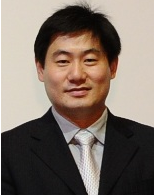报告时间:2017年1月5日16:00
报告地点:科技创新大楼C501
报告题目:Interface Engineering for 2D Phosphorene Based Optoelectronic Devices

Wei Chen 1,2,*
1Department of Physics National University of Singapore, Singapore 117542,Singapore
2Department of Chemistry, National University of Singapore, 117543, Singapore
* Email: phycw@nus.edu.sg
Abstract:
Black phosphorus (BP), as a fast-emerging two-dimensional (2D) material, stands out from other members in 2D family such as graphene and transition metal dichalcogenides (TMDs),and attracts substantial research interests attributed to its remarkably unique fundamental properties and versatile device applications. In this talk, I will summarize and discuss our recent work for interface engineered 2D materials phosphorene based field-effect-transistors (FETs) and photo-transistors, through the combination of in-situ FET device evaluation and photoelectron spectroscopy investigation. We will particularly emphasize on the electron and hole doping effect on the transport properties and optoelectronic response of phosphorene devices.
References:
(1) “Surface Transfer Doping Induced Effective Modulation on Ambipolar Characteristics of Few-layer Black Phosphorus” Xiang D, Han C, Wu J, Zhong S, Liu YY, Lin JD, Zhang XA, Hu WP, Özyilmaz B, Castro Neto AH, Wee ATS, Chen Wei*,Nature Communication 6, 6485 (2015)
(2) “Epitaxial Growth of Single Layer Blue Phosphorene: A New Phase of Two-Dimensional Phosphorus" JL, Zhao ST, Han C, Wang ZZ, Zhong S, Sun S, Guo R, Zhou X, Gu CD, Yuan KD, Li ZY*, Chen Wei*,Nano Letter16, 4903-4908 (2016)
Bio:
Dr. CHEN Wei is currently an Associate Professor (2013 - ) in both Chemistry Department and Physics Department at National University of Singapore (NUS). He received his Bachelor’s degree in Chemistry from Nanjing University (China) in 2001, Ph.D. degree from Chemistry Department at NUS in 2004 under the supervision of Prof Loh Kian Ping and Prof Andrew T. S. Wee. His current research interests include Molecular-scale Interface Engineering for Molecular, Organic and 2D Materials-based Electronics, and Interface-Controlled Nanocatalysis for Energy and Environmental Research. He has also published more than 200 papers on high-impact peer-reviewed journals in these topics, including 14 invited review articles, and receiving over 6500 citations with H-index of 42. Dr. Chen is a recipient of the Lee Kuan Yew Research Fellowship (2006), Omicron Nanotechnology Award (2009), Hitachi Research Fellowship (2010), Singapore Young Scientist Award (2012), NUS Young Scientist Award (2013) and NUS Dean’s Chair Professor.
